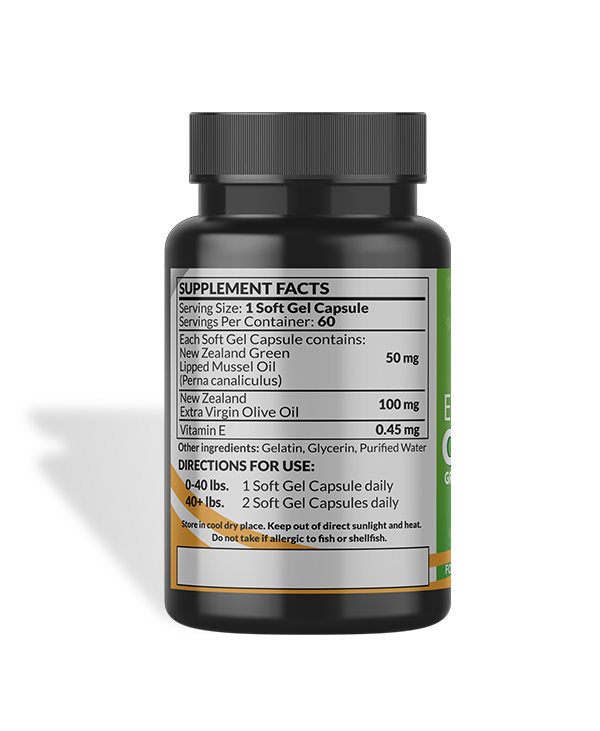As the winter season sets in, many pet owners become concerned about how the cold weather can affect their furry companions, especially those dealing with arthritis. Just like humans, dogs with arthritis can experience increased discomfort during the winter months. In this blog post, we will explore some expert tips and strategies to help manage arthritis in dogs and ensure they stay comfortable and active even in the chilliest of winters.
Understanding the Impact of Cold Weather on Dog Joints
While the exact reasons for the impact of cold weather on a dog’s joints are not fully understood, several factors are thought to contribute to increased joint pain in colder temperatures. These include:
- Joint Fluid Thickening: The fluid inside the joints, which helps absorb shock during movement, can thicken in colder weather. This thicker fluid may not flow as freely, leading to joint stiffness and discomfort.
- Changes in Atmospheric Pressure: Cold weather often coincides with a drop in atmospheric pressure. This can cause joint tissues to expand, potentially contributing to pain, particularly in dogs with arthritis.
- Decreased Activity Levels: Both humans and animals tend to be less active in the winter. Reduced physical activity can result in joint stiffness and pain. It is common for pet owners to cut back on outdoor activities, such as daily walks, when temperatures plummet.
It is important to note that not all dogs with arthritis will necessarily experience worsened symptoms during the winter. Observing your pet for changes in behavior and mobility is crucial.
Signs of Worsening Arthritis in Dogs
- Decreased activity level.
- Unwillingness to play or exercise.
- Stiff movement, especially when transitioning from sitting or lying down to standing (or vice versa).
- Limping or lameness while walking.
- Changes in how your pet sits, such as leaving a leg extended.
Tips for Managing Arthritis in Winter
- Manage Your Dog’s Weight: It is essential to monitor and maintain your dog’s weight, especially during winter when both humans and their pets tend to be less active. Excess weight places additional stress on joints, worsening joint pain and stiffness. Consult your veterinarian for guidance on weight management.
- Utilize Heat and Cold: Localized application of heat (e.g., heating pad) can alleviate pain, joint stiffness, and muscle spasms in some cases. On the other hand, cold (e.g., ice pack) can help limit acute pain and reduce the production of inflammatory chemicals. Consult your vet to determine which option is best for your dog.
- Keep Your Dog Warm: During cold winter walks, dogs with arthritis, especially those with shorter coats, benefit from wearing dog jackets to prevent symptoms worsening. Consider providing comfortable dog sweaters or coats indoors, particularly if your home tends to be drafty or cooler.
- Provide Comfortable Resting Spots: Ensure your arthritic dog has a comfortable dog bed designed to support aging joints. Offering multiple supportive spots around the house and a cozy dog blanket for extra warmth can help your pet rest comfortably.
- Maintain Regular Exercise: Regardless of the weather, it is crucial to keep your arthritic dog active during winter. Low-impact activities like short walks multiple times a day can help keep joints lubricated and maintain muscle strength. If outdoor walks are challenging due to icy conditions, consider indoor alternatives.
- Assist Your Dog with Ramps and Stairs: Joint pain can make it difficult for dogs to access their favorite spots. Consider using dog ramps and stairs to help your pet reach higher surfaces more easily.
Easing the Discomfort of Arthritis in Dogs
For dogs dealing with arthritis, each day can be a struggle with pain and stiffness. As a devoted pet owner, you are constantly on the lookout for ways to alleviate their discomfort and ensure a pain-free life. In this comprehensive guide, we will delve into the challenges posed by arthritis in dogs, particularly during cold weather, and introduce you to Essential OMEGAS—an essential component in managing arthritis symptoms. Join us on this journey to enhance your furry friend’s joint health and well-being, making sure they thrive even in the midst of winter’s chill.
Essential OMEGAS: Supporting Joint Health
When it comes to managing arthritis in dogs, the choice of supplements plays a pivotal role. In this context, Essential OMEGAS take center stage. These supplements are a treasure trove of beneficial omega-3 fatty acids, featuring renowned components such as DHA (Docosahexaenoic Acid) and EPA (Eicosapentaenoic Acid). These fatty acids are celebrated for their potent anti-inflammatory properties, which can provide much-needed relief to dogs dealing with joint pain and arthritis.
However, the true magic of Essential OMEGAS lies in a rare fatty acid called ETA (Eicosatetraenoic Acid), a prized component exclusive to green-lipped mussels. ETA is considered a secret weapon against joint discomfort, significantly intensifying the supplement’s effectiveness in combatting inflammation associated with joint pain and arthritis in dogs. Essential OMEGAS are meticulously formulated to offer comprehensive joint support, making them the natural and holistic choice for dog owners who are dedicated to enhancing their pets’ joint health and overall well-being.
The Powerful Components of Essential OMEGAS: Essential OMEGAS are a powerhouse of essential ingredients carefully selected to address canine arthritis and joint pain effectively. Here’s a closer look at the key components:
- Green-Lipped Mussel Oil: Sourced from the pristine waters of New Zealand, this exceptional oil is rich in Omega-3 fatty acids, including DHA and EPA, known for their anti-inflammatory properties. It also contains ETA, an exclusive fatty acid that plays a crucial role in reducing joint discomfort.
- Extra Virgin Olive Oil: Sourced in New Zealand and recognized for its exceptional purity and quality, Extra Virgin Olive Oil is a natural source of monounsaturated fats and antioxidants. This addition complements the anti-inflammatory prowess of Omega-3 fatty acids, reducing oxidative stress on the joints, a crucial aspect of joint health management.
- Vitamin E: Another vital component sourced in New Zealand, Vitamin E, contributes its antioxidant abilities to the mix. By protecting cells from damage caused by free radicals, it promotes cellular health and supports the overall function of joints.
The Role of Essential OMEGAS in Managing Canine Arthritis and Joint Pain: Essential OMEGAS plays a critical role in managing canine arthritis and joint pain. These supplements offer more than just nutritional value; they actively contribute to minimizing inflammation—a primary cause of discomfort in dogs with arthritis.
- Omega-3 Fatty Acids (DHA, EPA, and ETA): Essential OMEGAS contain these essential Omega-3 fatty acids, which have been shown to reduce the inflammatory response in the body. This reduction in inflammation can lead to a decrease in joint swelling and pain, providing much-needed relief to affected dogs.
- Enhanced Blood Circulation: Regular supplementation with Essential OMEGAS enhances blood flow during physical activity. This improved circulation ensures that nutrients and oxygen are efficiently delivered to joint tissues, aiding in their recovery and health. This improved circulation is especially beneficial during exercise, as it helps reduce joint stiffness and eases swelling in affected joints.
Incorporating Essential OMEGAS into your dog’s daily routine can help reduce inflammation, alleviate joint pain, and improve mobility. It is essential to consult your veterinarian for guidance on the appropriate dosage based on your dog’s size and specific needs.
By following these tips and incorporating Essential OMEGAS into your dog’s diet, you can ensure that your furry friend enjoys a comfortable and active winter season, regardless of the challenges posed by arthritis and cold weather.
Making Winter a Season of Comfort for Your Canine Companion
As we embrace the winter months, it is crucial to remember that our beloved dogs, especially those battling arthritis, deserve extra care and attention to ensure their comfort and vitality. The cold weather can pose unique challenges to their joint health, but with the right strategies, we can help them thrive in any season.
From managing their weight and providing warmth to incorporating low-impact exercises and offering comfortable resting spots, there are several steps we can take to alleviate the impact of arthritis during winter. These measures not only enhance their quality of life but also contribute to a cozy and pain-free season for our furry friends.
One crucial element in this holistic approach to arthritis management is the inclusion of Essential OMEGAS in their diet. These supplements, enriched with omega-3 fatty acids and the rare ETA from green-lipped mussels, offer potent anti-inflammatory properties that can reduce joint inflammation, alleviate pain, and enhance mobility. By consulting with your veterinarian and incorporating Essential OMEGAS into your dog’s daily routine, you provide comprehensive joint support and ensure a comfortable and active winter season.
Let’s make this winter a time of warmth, comfort, and happiness for our canine companions. Together, we can help them thrive in the face of the cold, ensuring that their tails keep wagging even when the temperatures drop.
Q & A
Q: How does cold weather affect a dog’s joints?
A: Cold weather can lead to joint fluid thickening, changes in barometric pressure, and decreased activity levels, potentially worsening joint pain in dogs.
Q: What are the signs of worsening arthritis in dogs during winter?
A: Signs include decreased activity, reluctance to play or exercise, stiff movement, limping, and changes in sitting posture.
Q: Can overweight dogs be more affected by joint pain in winter?
A: Yes, excess weight can worsen joint pain in dogs during winter, as it increases stress on their joints.
Q: How can I help my arthritic dog maintain a healthy weight in winter?
A: Consult your veterinarian for weight management strategies tailored to your dog’s needs, including diet and exercise recommendations.
Q: Are there specific dog jackets for arthritic dogs during winter walks?
A: Yes, specialized dog jackets designed for warmth and joint support can help arthritic dogs during cold weather outings.
Q: What is the benefit of providing a comfortable dog bed for arthritic dogs in winter?
A: A comfortable bed designed to support aging joints offers relief and warmth, enhancing your dog’s comfort during winter.
Q: How can I keep my arthritic dog active during winter without causing joint strain?
A: Engage in low-impact exercises, such as gentle walks, to keep your dog’s joints mobile without overexertion.
Q: Are there any local applications that can help arthritic dogs with joint pain in winter?
A: Yes, both heat and cold applications can assist, depending on the specific issue. Consult your vet for recommendations.
Q: What supplements can benefit arthritic dogs in winter, and how do they work?
A: Essential OMEGAS, enriched with omega-3 fatty acids, can reduce joint inflammation, and alleviate pain in arthritic dogs during winter.
Q: How can I ensure my dog’s winter routine includes all the necessary joint care measures?
A: Maintain a balanced approach by managing weight, providing warmth, exercise, and comfortable resting spots, and incorporating Essential OMEGAS into your dog’s diet for comprehensive joint support.
Essential OMEGAS
$49.00 - or Subscribe and Save 10%






